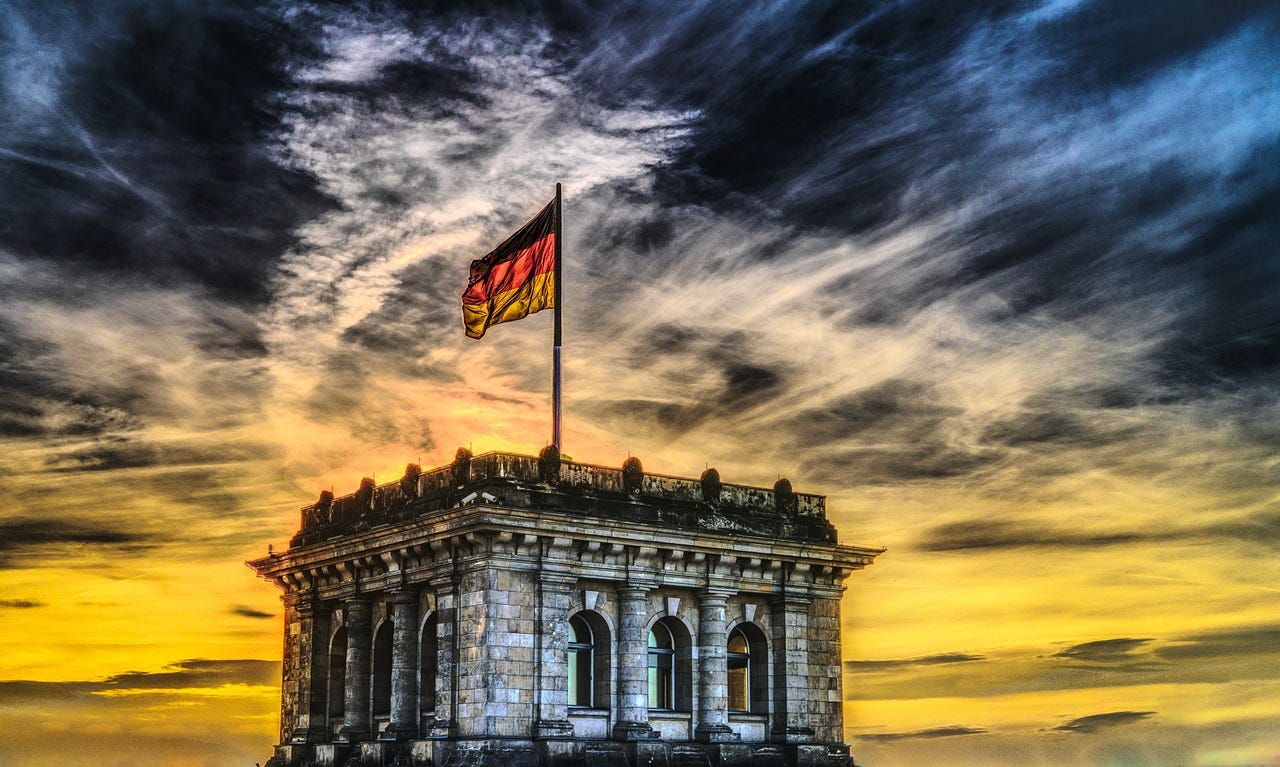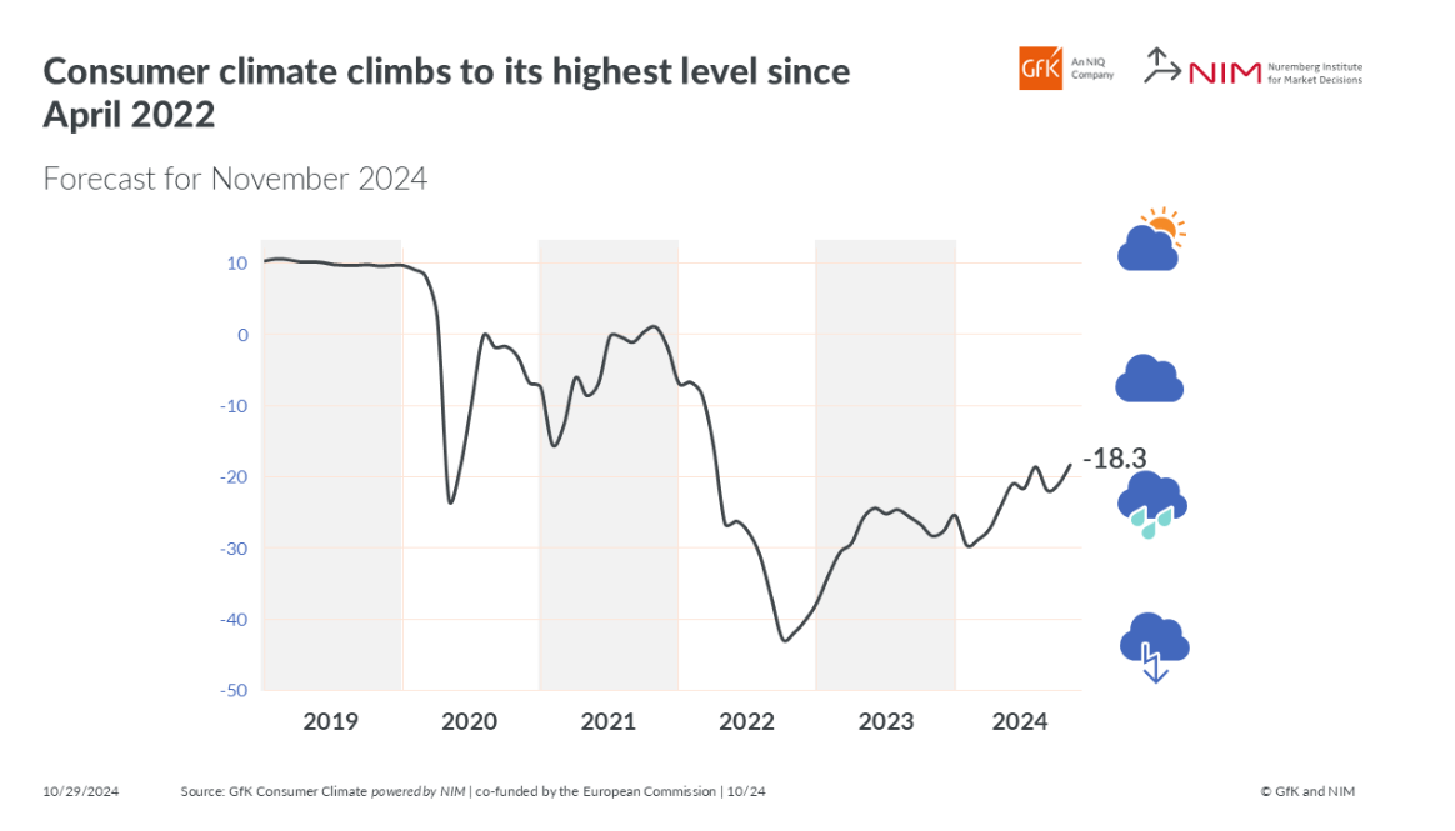German Economy Faces Strong Headwinds Despite Return to Growth
Volkswagen's decision to close factories to cut costs will weigh on German economy

The German economy faces strong headwinds despite data showing that Europe’s largest exporter of goods returned to economic growth in the third quarter, beating analysts’ estimates.
The economy grew by 0.2% quarter-on-quarter in Q3, from an initial -0.1% in Q2, the Federal Statistical Office (Destatis) reported today. But it shrank by 0.2% on the year in Q3 after price and calendar adjustments, Destatis said. Analysts had a Q3 forecast of -0.1%.

German inflation accelerated to 2% in October from 1.6% in September, or well above the expected 1.8%, Destatis data showed today. Food prices, which accelerated 2.3% in October from 1.6% in September, and higher energy prices drove inflation higher.
The German DAX40 declined 1.1% today, closing at 19,266.
German Economy Remains Stuck In Stagflation
Though positive, the German economy, Europe’s largest, faces considerable challenges due to both cyclical and structural headwinds.
“The German economy avoided a technical recession in the third quarter, showing unexpected growth,” ING Think said. “However, this does not change the fact that the economy remains stuck in stagnation."
Germany revised its second quarter’s contraction to -0.3% quarter-on-quarter from the initial -0.1%. This “somewhat dampened” the “positive surprise,” ING Think said.
The rise in GDP growth coincided with an improvement in consumer sentiment in November, though the level still remains low, a survey showed on Tuesday. The Gfk German Consumer Climate Index is forecast to rise by 2.7 points to -18.3 points in November compared to the previous month.

German Economy Hurt By Crises, Wars
Although this was the highest level in Gfk German Consumer Climate Index since April 2022, Germans are “pessimistic about overall economic development,” the survey said.
“The uncertainty caused by crises, wars and rising prices is still very much present,” Rolf Bürkl, consumer expert at the Nuremberg Institute for Market Decisions, said.
“Reports of a rising number of company insolvencies and plans to cut jobs or relocate production abroad are also preventing a more significant recovery in consumer sentiment,” Bürkl added.
Volkswagen (OTC:VWAGY), for example, announced on Monday the closure of three German factories and potential mass layoffs. High operating costs, a weak electric vehicle lineup, and diminishing demand in key markets drove the decision.
Europe's biggest carmaker is closing factories to cut costs while a looming trade war with China weighs on sentiment after the European Union (EU) imposed tariffs on electric vehicles.
Volkswagen’s Costs Rise, As Layoffs Loom
Facing pressure from intense competition and rising energy and labor expenses, Volkswagen has taken unprecedented steps to close plants on German soil. This is the first time it had done so in the company’s 87-year history.
Volkswagen brand CEO Thomas Schäfer pointed out the problems in domestic production, as plants operate 25-50% above the firm’s target expenses. “We are not productive enough at our German locations,” Schäfer stated, stressing the urgent need for cost cuts.
Meanwhile, Volkswagen’s works council head Daniela Cavallo called the plan “a starvation, a weakening in installments” that threatens “tens of thousands of jobs in Germany.”
“Management is absolutely serious about all this,” she said. “This is not saber-rattling in the collective bargaining round.”
Volkswagen car sales in Europe, Source: ACEA
German Economy Will Feel Strain Of Plant Closures
The closures are poised to further strain the German economy, sparking concerns about the long-term future of its industrial economy. GDP is already forecasted to contract for a second consecutive year.
Volkswagen’s main restructuring plan sees salary freezes for 2025 and 2026 and a reduction in existing salary levels by at least 10%. It will abolish one-off payments for workers who have stayed at the company for 25 and 35 years. This could impact up to 140,000 workers.
In response, workers protest the proposed changes in Wolfsburg, home to the company’s headquarters. The powerful IG Metall union has threatened strikes by December if no agreement is reached.
VW (OTCPK: VLKAF) shares fell to €88.92, reaching the second-lowest point in 2024, far below the intra-year peak of €123.30.
EU Tariffs On China’s EVs Will Hurt German Economy
As Volkswagen shutters plants, the EU has introduced new tariffs on electric vehicles (EVs) imported from China. This will escalate trade tensions over Chinese subsidies, which may have a significant impact on German car manufacturers.
As of October 30, the EU introduced tariffs ranging between 7.8% and 35.3% on Chinese EV makers. This is in addition to the existing 10% import duty, with the highest surcharge applied to vehicles from Chinese state-owned automaker SAIC.
The Chinese Ministry of Commerce dismissed the tariffs as “trade protectionism” and has vowed to safeguard Chinese businesses’ interests. It lodged a complaint with the World Trade Organization.
Volkswagen’s financial chief, Arno Antlitz, cautioned that “under a tariffs regime, an industry only loses time.” He warned that Chinese automakers might still access the market through European-based production.
This tactic is underway, with Chinese automakers BYD and Leapmotor setting up production facilities in Europe and Turkey to sidestep tariffs.
“In a world in which, at least in manufacturing, China has become the new Germany,’ Germany’s old macro business model of cheap energy and easily accessible large export markets is no longer working,” ING Think said. “Looking ahead, there is very little reason to expect any imminent relief.”




